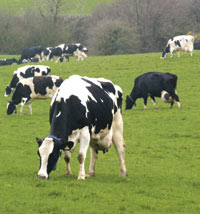Milk quotas must go, says commissioner

Milk quotas will not be cut in 2010 as a short-term measure to shore up the depressed dairy market and they will be abolished in 2015 as planned, according to EU farm commissioner Mariann Fischer Boel.
Addressing the European parliament agriculture committee for the first time since the summer recess, Mrs Fischer Boel made it plain she was sticking to her guns over the quota issue.
“The long-term future of the quota system is clear: It will be abolished in 2015.” Prolonging the “heavy-handed central planning” of the milk quota system would hold back efficiency, raise production costs and make it harder for young farmers to enter the sector, she said.
“And in the short and medium term, cutting back quotas – as some have asked for – would not be the right recipe either. We have asked farmers to prepare for a dairy sector without quotas. If we make a U-turn now, there will be total confusion.”
As well as dismissing calls for tigher quotas, Mrs Fischer Boel also rejected a European parliament proposal for a “dairy fund” to support restructuring, questioning where the money would come from. “The draft budget for 2010 leaves only a very limited margin. For the following years, the risk of financial discipline is becoming real, so here also we can’t bank on having money available.”
Despite this, the commission was being proactive in using traditional market measures to support the market, she insisted. “We forecast total spending of €400m on the dairy sector in budget year 2009, and €600m in budget year 2010. This is rather more than pocket money – and it’s taking effect. The market is coming back into balance and dairy prices have stabilised.”
Speaking to journalists after the meeting, agriculture committee chairman Paulo de Castro said he welcomed the “timid” signs of recovery now emerging in the global dairy markets, but he did not believe the EU Commission’s actions went far enough. There was no structural surplus of milk, he suggested. The crisis was more down to falling demand. He therefore called on the EU Commission to do more to stimulate the market – especially for cheese.
Mrs Fischer Boel suggested some of the blame lay with the supermarkets, explaining that, while producer prices for dairy products had plunged below where they were before the price spike of 2007, consumer prices were still 14% higher. “This makes me think there are problems in the supply chain, and I look forward to presenting our analysis of this issue at the end of this year.”
* Will Mrs Fischer Boel stay or will she go-go? See Phil Clarke’s Business Blog
